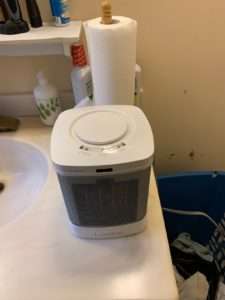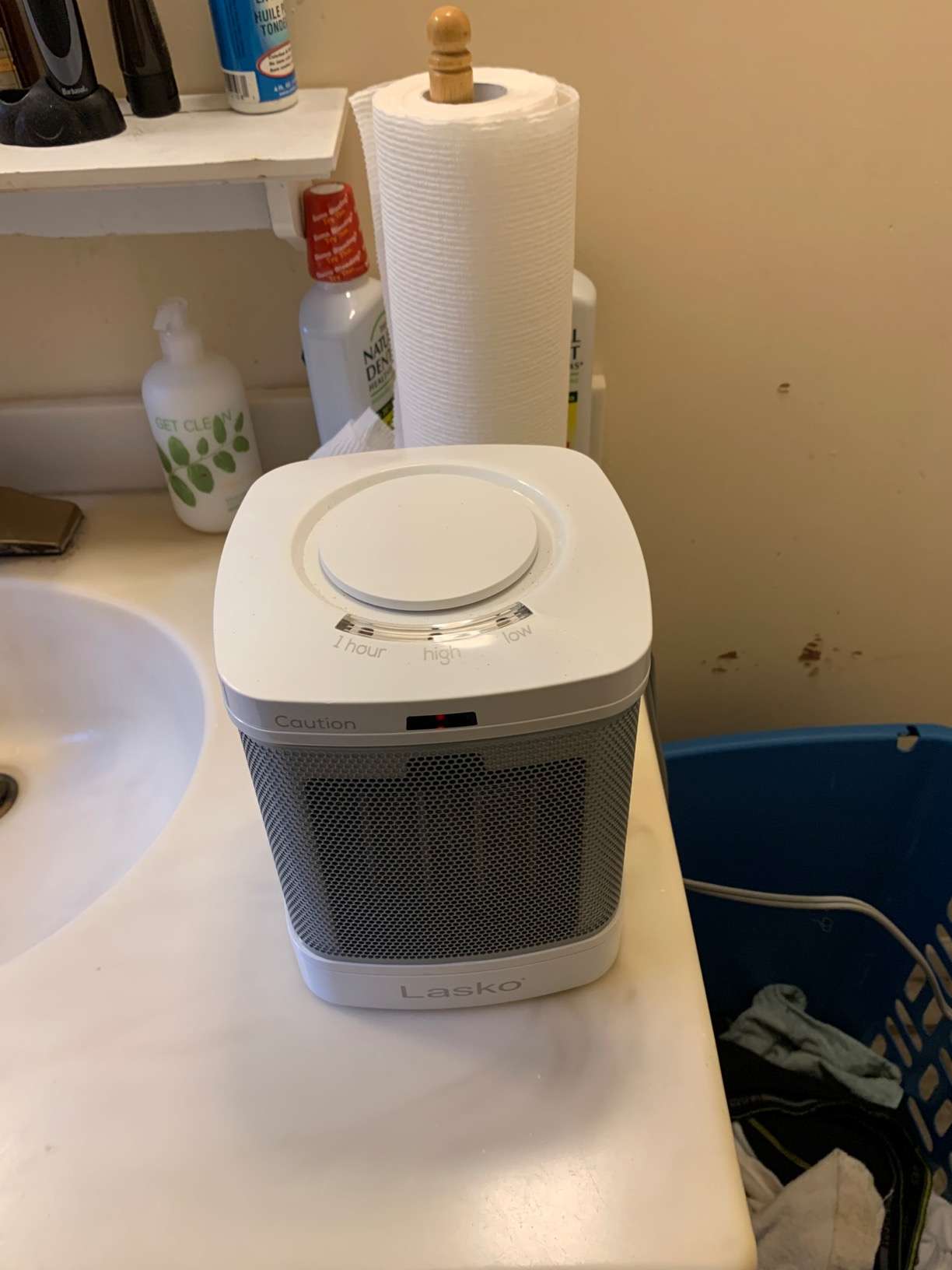This post may contain affiliate links which means I may receive a commission for purchases made through links.

Heating the bathroom is a great way to stay warm and cozy when you step out of the shower or bathtub. Plus, this prevents moisture build-up on baseboards, walls, curtain showers, faucets, and light fixtures. As a result, the bathroom dries out faster compared to a bathroom without a heater. Best of all, adding a heat source in the bathroom improves overall health and prevents achy joints & sore muscles.
Unfortunately, most bathrooms don’t have a heat source since a vent from the central HVAC has not been extended into the space or some supplemental heat source hasn’t been installed. For that reason, homeowners are constantly looking for the best heaters for the bathroom, with some considering the use of electric baseboard heaters.
But, is it safe to install an electric baseboard heater in the bathroom? Let’s find out!
Can you use a baseboard heater in the bathroom?
Yes, it’s possible to use an electric baseboard heater in your bathroom. However, other options like an electric wall heater are a better option than baseboard heating for various reasons.
First, bathrooms are usually small rooms where all types of plumbing and electrical fixtures are crammed in. This leaves a small amount of floor space to put a baseboard heater since convection heating requires a decent amount of space for effective operation. For that reason, radiation is the most efficient way of heating a bathroom, instead of convection. Convection is a form of heat conduction that involves transferring heat through the air.
Secondly, the bathroom poses additional severe conditions on the baseboard heater covers. For instance, hot showers increase the level of humidity in the air. This moisture can easily shorten the life of your baseboard heater covers by accumulating under the paint and promoting the rusting process.
In addition, using an electric baseboard heater near water in your home poses the risk of electrocution for anyone using the bathroom. According to the United States CPSC (Consumer Product Safety Commission), most electric heaters don’t have electrocution protection features to safeguard the equipment if it comes in contact with water. So, while you can use an electric baseboard heater in the bathroom, it’s not recommended for safety concerns.
However, if you still insist on using a baseboard heater in the bathroom, it’s important to exercise caution for safety reasons. For instance, you should ensure that there is a clear space of about 24” – 32” in front of the bidet or toilet. Here are some safety precautions you also need to consider if you’re planning to use an electric baseboard heater in a bathroom!
Safety Precautions to consider when using an electric heater in the bathroom
With a few safety precautions, electric heaters are safe for use in bathrooms. Like any other electrical appliances, electric heaters for bathrooms can cause short circuits or electrocutions when they come into contact with moisture or water. Other than that, most bathroom heaters are small, compact devices that can heat a floor space of up to 200 sq ft.
Getting back to safety precautions, you need to ensure that your bathroom has GFCI (Ground-Fault Circuit Interrupter) outlets. A GFCI outlet constantly monitors the current flowing through the circuit and automatically shuts off power if it detects the slightest amount of stray current. This helps to prevent a fatal electrical shock in case of electrocution. A GFCI outlet usually has 2 buttons that say ‘reset’ and ‘test’.
Also, look for a bathroom heater that has an ALCI (Appliance Leakage Current Interrupter) plug. An ALCI plug adds extra protection by monitoring and safeguarding against fluctuations in current.
Lastly, look for a bathroom heater that has a tip-over switch. This will automatically shut off the heater if you unintentionally knock it over.
Different types of electric bathroom heaters are available
There are types of electric heaters that are ideal for use in bathrooms as they are both safe and splash-proof. For instance, there are compact & stylish wall- and ceiling-mounted heaters, which are highly energy-efficient and suitable for heating smaller bathrooms. Alternatively, you can use fully enclosed slimline electric panel heaters to replace old & inefficient central heating radiators as they take up minimal space.
However, before you choose any electric bathroom heater over the other, it’s good to understand the different types available. This will help you make the best option and enjoy a warmer bathroom experience without worrying about high energy bills.
With that in mind, the most commonly used types of electric heaters for bathrooms include;
-
Portable bathroom heaters
Portable bathroom heaters are commonly used by homeowners that only need more warmth in their bathrooms during the winter. This allows them to use the heating device in the bathroom in the colder months, and store it away for the rest of the year. Another benefit of using a portable heater is that you can only use it when you’re in the bathroom. Afterward, you can take it with you and repurpose it in another room within your house.
-
Heater/ exhaust fan
One benefit of using a heater/ exhaust fan in your bathroom is that it prevents humidity buildup in the air. At the same time, the appliance prevents steam from damaging your bathroom furniture, ceiling, or wall.
-
Ceiling heaters
Ceiling heaters are an excellent option for homeowners that want a permanent heating solution in their bathroom. Due to their location, these units are very safe and impossible to obstruct since you don’t risk touching them. Best of all, ceiling heaters are far away from any water sources, thus reducing the risk of electrocution.
-
Wall-mounted heaters
As the name suggests, these types of bathroom heaters are mounted on the wall. This makes them another great permanent option for heating your bathroom. In addition, this minimizes the amount of space they take up in the bathroom. Even better, you can mount them at an appropriate height that is out of reach for pets and children.
Factors to consider when choosing the best electric bathroom heater
Electric bathroom heaters offer several benefits such as providing instant heat and reducing your energy bill. In addition, they prevent dampness, while efficiently warming up your chilly bathroom. However, before you decide to settle on a particular electric bathroom heater, there are some important factors you need to consider. Some of these factors include;
-
Safety Features
As mentioned earlier, safety is one of the most important factors when choosing an electric heater for your bathroom.
Besides, not every space heater on the market is suitable for use in the bathroom. Instead, make sure you choose a space heater that has safety features & mechanisms that makes it suitable for use in wet & damp environments. More importantly, ensure that the unit you want to buy has a safety certification label from an independent testing organization like CSA, UL mark, or the ETL label from Intertek. In addition, look for a unit with a smart sensor that automatically shuts it off when it over heaters. Some units have a tip-over switch that automatically shuts off the device when you accidentally knock it over.
Are portable bathroom space heaters safe?
Most portable space heaters come with ACLI safety plugs, making them safe for use in basements, kitchens, and bathrooms. According to OSHA, an ACLI safety plug cuts ground fault in less than a second.
However, an ACLI safety plug doesn’t help to prevent electrical shock completely. Therefore, you should still exercise caution when using them in wet areas. In addition, you should test the ACLI plugs and outlets in your bathroom every month, and replace them if they fail.
Safety of wall- & ceiling-mounted bathroom heaters
Wall-mountable, wall-recessed, and ceiling heaters are a much safer option for heating your bathroom than portable space heaters. However, you need to hardwire them to the existing wiring to ensure safe usage and eliminate the risk of electrical shock.
Note: hardwiring of all bathroom electrical appliances should be done by a qualified electrician to ensure it complies with relevant safety regulations. Besides, Hardwiring provides a clean aesthetically-looking fit that can only be achieved by a professional. At the same time, a professional electrician will assess the additional load on your home’s electricity and select the correct voltage. If your bathroom has a GFCI outlet, consider using a portable heater with an ACLI safety plug.
-
Size & shape of the bathroom
Carefully measure your bathroom and calculate how many sq ft you intend to heat with an electric heater. Also, make sure you consider the layout of the bathroom and select the most appropriate place for its installation.
How to size an electric bathroom heater
Similar to calculating the ideal baseboard heater size for your home, choosing the correct bathroom heater is one of the most crucial decisions you’ll ever make. Choosing a unit that is too big for your bathroom will never operate properly. Instead, it might leave you feeling cold with a huge electricity bill.
Bathroom fans use CFMs against square footage to determine the ideal exhaust fan for a bathroom. However, you can either measure the right size of your electric bathroom heaters according to their BTUs or wattage output.
Wattage output
In general, 10 Watts of power generates enough heat for every square foot. So, after calculating the floor space of your bathroom, multiply the square footage by 10 to get the total wattage requirement.
BTUs
If the unit’s heating capacity is rated in BTUs, 1 Watt is equivalent to 3.41 BTUs. So, to convert its BTU rating to watts, divide the total BTUs by 3.41 to get the room’s wattage requirement.
-
Placement
Placement is another important factor you need to consider when choosing the right heater for your bathroom alongside other aspects like sizing, safety, and airflow.
If you’re planning to buy a portable space heater, put it in a safe spot in your bathroom like a chair or far corner. Portable heaters are a great option for apartments or homeowners who don’t want to install wall heaters. This is because you can easily carry them around and even use them in other rooms or offices.
On the other hand, if you want to install a wall-mounted or recessed bathroom heater, consider manufacturer clearances and install them at the correct distances from the floor and wall. And if you’re familiar with electrical works, hire or consult an expert electrician before you install the heater.
In general, all bathroom heaters should be kept at a safe distance from sinks, showers, and tub edges. Never put the heater near towels or other objects that will obstruct airflow to the device. Similarly, don’t drape towels or clothing on a portable space heater. Also, don’t put wall-recession appliances inside showers or other places where water can splash into the device. Lastly, make sure your wall-recessed or mounted heater isn’t obstructed by doors or corners to adequately heat the bathroom.
Conclusion
To sum up, it’s possible to install and use an electric baseboard heater in the bathroom, provided you do it safely to reduce the risk of accidents while in the bathroom. Alternatively, you can choose one of the many great electric bathroom heaters on the market. These products are designed to withstand humid environments and possess a solid waterproof rating. In addition, bathroom heaters have various heating technologies you can choose from ranging from infrared heating to convection heating for portable, wall-recessed, and wall-mounted models!
